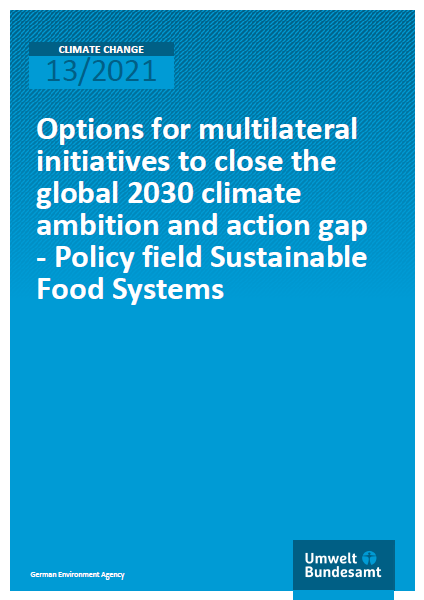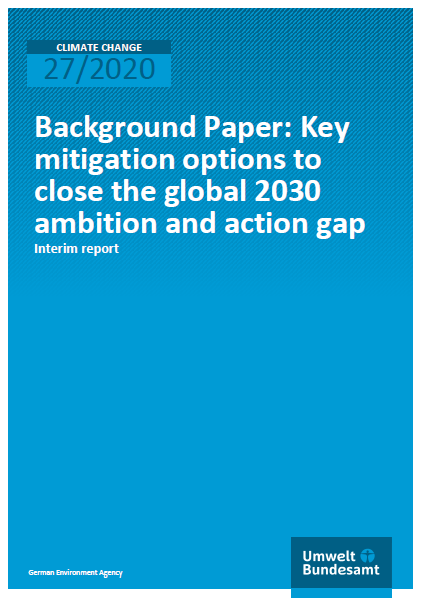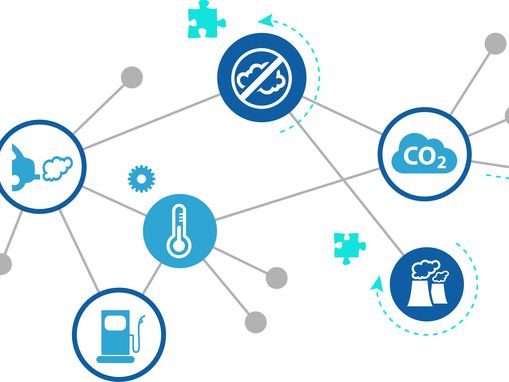Options for Multilateral Initiatives to Close the Global 2030 Climate Ambition and Action Gap
Policy field energy transition
- Publication
- Citation
Görlach, Benjamin and Ursula Fuentes Hutfilter 2021: Options for multilateral initiatives to close the global 2030 climate ambition and action gap - Policy field energy transition. CLIMATE CHANGE 01/2021. Federal Environment Agency: Dessau-Roßlau.
To achieve the turnaround towards carbon neutrality, countries around the world need to take much more ambitious action in this decade. One of the key fields of action is the transition of the energy sector –from fossil to renewable fuels, while drastically reducing energy consumption. This paper discusses options how such action can be enhanced through multilateral cooperation.
To do so, it first provides an overview of the landscape of the most relevant international initiatives (partnerships, platforms, alliances and networks) that address issues related to energy transition, particularly on promoting energy efficiency, the uptake of renewable energies, access to energy or the phase-out of fossil fuels.
Out of a longlist of 19 relevant initiatives, five initiatives were selected to offer a mix of the different priority areas (energy efficiency, renewables and fossil fuel phase-out). These five initiatives are subsequently analysed in detail and described in terms of their role and expected impact:
- The Renewable Energy and Energy Efficiency Partnership (REEEP),
- The International Partnership for Energy Efficiency Cooperation (IPEEC),
- Sustainable Energy for All (SEforALL),
- The IRENA Coalition for Action, and
- The Powering Past Coal Alliance (PPCA).
Both the survey and the in-depth assessment have shown that there is already a plenitude of initiatives, alliances, partnerships and networks that is devoted to promoting different aspects of the energy transition. At the same time, the analysis has also shown that several gaps remain, which are not (or not adequately) addressed by the existing tools. To address these gaps, the policy paper sketches five potential initiatives for enhanced multilateral cooperation on energy transition:
- Global initiative for a Green Recovery: the stimulus and recovery packages that countries have adopted in response to the COVID-19 pandemic need to be aligned with the goals of the energy transition. This proposed initiative would foster exchange on recovery efforts across different countries, and possibly provide coordination on some aspects.
- Supply-side initiatives: virtually all existing initiatives aim to reduce the consumption of fossil fuels, or increase the supply of non-fossil fuels. This initiative would provide for engagement and exchange on strategies to reduce the supply of fossil fuels and to manage their consequences, including finance, just transition and re-aligning fossil value chains.
- Government-level initiative for 100% renewables: similar to the existing club of private companies that have committed to a fully renewable electricity supply, this initiative would bring together states and sub-national entities that commit to such targets, as a knowledge forum for the challenges of transitioning to a fully renewable energy supply.
- Dedicated institution for Energy Efficiency: compared to the promotion of renewables, energy efficiency and energy conservation continue to receive less political attention. Important international initiatives in this field have discontinued or await an uncertain fate. This could be resolved through a renewed and reinforced initiative, possibly as an institution dedicated solely to promoting energy efficiency –an international energy efficiency agency.
- Alliance targeting the non-usual suspects: the existing initiatives that are active in the field tend to convene the same set of "usual suspects" of ambitious and like-minded countries. This initiative would specifically target the countries that are less well represented in existing initiatives, by offering a framing and focus that is more commensurate with their political priorities and national circumstances.



